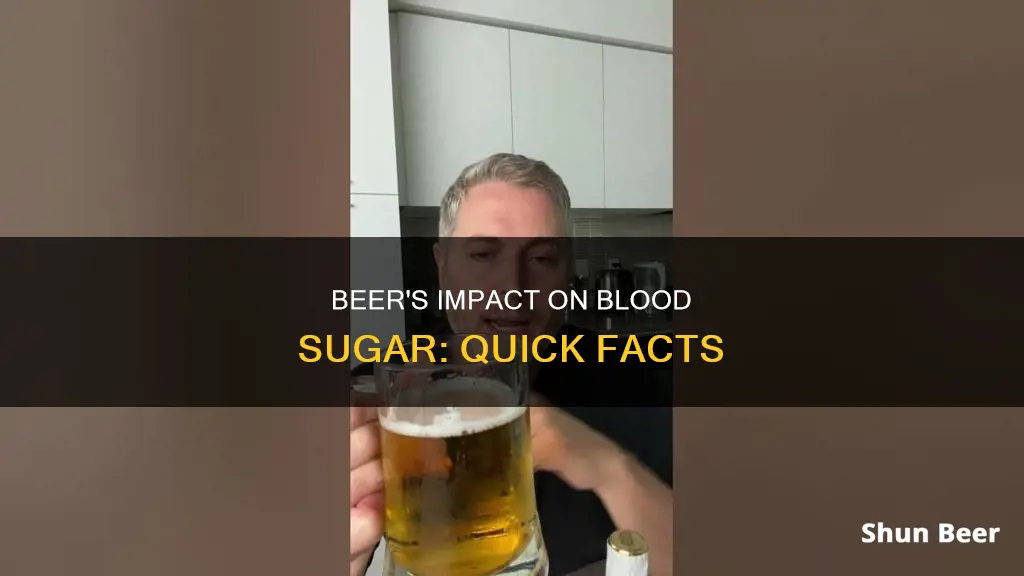
Alcohol can have a significant impact on blood sugar levels, especially for people with diabetes. The liver, which is responsible for stabilising glucose levels, prioritises breaking down alcohol over releasing glucose into the bloodstream. This interruption to the liver's function can lead to hypoglycaemia, where blood sugar levels drop dangerously low. The risk of hypoglycaemia is heightened when drinking on an empty stomach, and the more drinks consumed, the higher the risk. Beer and sweetened mixed drinks are high in carbohydrates, which can cause a temporary rise in blood sugar levels. Alcohol can also affect the effectiveness of diabetes medications, and increase weight gain, making it more difficult to manage diabetes.
What You'll Learn
- Beer and sweet wines are high in carbohydrates, which can raise blood sugar
- Alcohol can cause low blood sugar (hypoglycemia)
- Alcohol can interfere with diabetes medication
- Alcohol stimulates appetite, which can cause overeating and increased blood sugar
- Alcohol can cause weight gain, making it harder to manage diabetes

Beer and sweet wines are high in carbohydrates, which can raise blood sugar
The effect of beer and sweet wines on blood sugar is due to the way alcohol is processed by the body. When you drink alcohol, your liver prioritises breaking it down over releasing glucose into the bloodstream. This interruption in glucose release can cause a rapid drop in blood sugar levels, a condition known as hypoglycaemia. Hypoglycaemia can occur even if you have well-managed diabetes and can lead to symptoms such as headaches, irregular heartbeat, anxiety, and confusion.
The risk of hypoglycaemia is higher when drinking on an empty stomach, and it is recommended to consume alcohol with food, especially carbohydrate-rich snacks, to help maintain normal blood sugar levels. Additionally, drinking slowly and in moderation is advised, as the risk of low blood sugar increases with each drink. It is also important to monitor blood sugar levels before, during, and after drinking, as well as up to 24 hours later.
Beer and sweet wines, being high in carbohydrates, can temporarily raise blood sugar levels. However, it is important to note that alcohol's interference with the liver's glucose-regulating function can also lead to a significant drop in blood sugar, especially when consumed without food. Therefore, it is crucial to follow the recommended guidelines for alcohol consumption and work with a healthcare provider to understand how it may affect your specific health concerns.
Beer and Blood Sugar: How Three Beers Affect You
You may want to see also

Alcohol can cause low blood sugar (hypoglycemia)
Alcohol can cause low blood sugar, also known as hypoglycemia, especially in people with diabetes. This is because the liver, which is responsible for detoxifying the body of alcohol, is also in charge of releasing glucose into the bloodstream to maintain healthy blood sugar levels. When you drink alcohol, your liver has to prioritise breaking it down over releasing glucose, which can lead to a drop in blood sugar levels. This risk is even higher if you drink on an empty stomach or when your blood sugar levels are already low.
The risk of hypoglycemia increases with each additional drink you have, and it can occur several hours after you've finished drinking. It's important to note that alcohol can also interfere with the effects of diabetes medications, increasing the risk of low blood sugar. Therefore, it's recommended that people with diabetes drink in moderation and only when their blood sugar levels are well-managed.
To prevent alcohol-induced hypoglycemia, it's advised to follow these guidelines:
- Drink alcohol with food, especially carbohydrates.
- Avoid drinking on an empty stomach or when blood sugar levels are low.
- Drink slowly and in moderation.
- Monitor blood sugar levels before, during, and after drinking, as well as before bedtime if you've had alcohol close to bedtime.
- Carry a source of sugar, such as glucose tablets, in case of low blood sugar.
- Avoid combining alcohol with exercise, as it increases the risk of low blood sugar.
- Wear a medical alert to inform others of your diabetes.
It's also important to be aware of the symptoms of hypoglycemia, which can include seizures, coma, lightheadedness, dizziness, and lack of coordination. If you experience any of these symptoms, it's crucial to take immediate action to raise your blood sugar levels and seek medical help if necessary.
Sugar Quantity for Brewing 40 Pints of Beer
You may want to see also

Alcohol can interfere with diabetes medication
Furthermore, alcohol can interact with certain diabetes medications, such as oral diabetes medicines, insulin, and specific drugs like chlorpropamide, metformin, and troglitazone. It can enhance their blood-sugar-lowering effects, leading to dangerously low blood sugar levels. Alcohol can also cause hypoglycemic unawareness, where a person may not experience or recognise the usual warning signs of low blood sugar, such as sweating, weakness, or a pounding heart. This increases the risk of severe hypoglycemia.
Additionally, alcohol consumption can worsen diabetes-related complications and increase the risk of certain health issues. For example, it can lead to disturbances in fat metabolism, worsen nerve damage (diabetic neuropathy), and contribute to eye damage (diabetic retinopathy). Alcohol can also cause weight gain, as it stimulates appetite and is often high in calories, making it harder to manage diabetes.
Therefore, it is crucial for people with diabetes to understand the risks associated with alcohol consumption and to consult their healthcare provider to determine if drinking is safe for them and how it may affect their medication.
Beers' Surprising Impact: Lowering Blood Sugar, How Many?
You may want to see also

Alcohol stimulates appetite, which can cause overeating and increased blood sugar
Alcohol can have a significant impact on blood sugar levels, particularly for people with diabetes. When you drink alcohol, your liver is occupied with breaking it down, which interferes with its function of releasing glucose into the bloodstream to maintain normal blood sugar levels. This can cause blood sugar levels to drop quickly, leading to hypoglycemia. The risk of low blood sugar remains for hours after drinking and increases with the number of drinks consumed.
Alcohol also stimulates the appetite, which can lead to overeating and further disruptions in blood sugar control. Several factors contribute to this effect. Firstly, alcohol lowers inhibitions, impairing judgment and portion control. This makes individuals more likely to indulge in unhealthy snacks or overeat without much hesitation. Secondly, alcohol interferes with hormones that regulate satiety, such as leptin and glucagon-like peptide-1 (GLP-1). By inhibiting these hormones, alcohol prolongs the feeling of hunger even after consuming a significant number of calories. Thirdly, research suggests that alcohol stimulates nerve cells in the brain's hypothalamus, specifically the AGRP neurons, which are associated with starvation and intense feelings of hunger. This neuronal response, rather than a simple loss of restraint, is what drives increased food intake after drinking.
The combination of alcohol's appetite-stimulating effects and its ability to impair judgment can lead to excessive calorie intake, particularly from unhealthy snacks often consumed alongside alcoholic beverages. This can result in weight gain, which further complicates blood sugar management, especially for individuals with diabetes. The calories from alcohol are stored in the liver as fat, leading to liver cell insulin resistance and higher blood sugar levels over time.
Additionally, the symptoms of alcohol intoxication can mask the symptoms of low blood sugar, making it difficult to distinguish between the two conditions. Both conditions share symptoms such as increased heart rate, confusion, and aggression. This overlap can lead to a delay in recognizing and treating low blood sugar, potentially resulting in dangerous health consequences.
To minimize the impact of alcohol on blood sugar and appetite stimulation, it is recommended to drink in moderation, preferably with a balanced meal that includes whole grains, complex carbohydrates, healthy fats, and protein. It is also important to avoid unhealthy snacks, stay hydrated, and monitor blood sugar levels before, during, and after drinking.
Best Sugar-Free Beers: Enjoy Guilt-Free Sipping
You may want to see also

Alcohol can cause weight gain, making it harder to manage diabetes
Alcoholic drinks are high in calories and can cause weight gain, which can make it harder to manage diabetes. Alcohol stimulates your appetite and may affect your judgment, causing you to overeat and disrupt your blood sugar control. It is also likely to increase abdominal fat.
Drinking alcohol can also affect your hormones. It can impair the functions of your glands that release hormones, which may cause weight gain. For example, drinking heavily may cause your adrenal glands not to regulate how much cortisol they secrete, leading to higher cortisol levels and increased abdominal weight gain.
Alcoholic drinks such as beer and sweetened mixed drinks are high in carbohydrates, which can raise blood sugar levels. Alcohol also has a lot of calories, which can lead to weight gain and make it harder to manage diabetes. Calories from alcohol are stored in the liver as fat, and liver fat makes liver cells more insulin resistant, which can make your blood sugar levels higher over time.
If you have diabetes, drinking alcohol can cause low or high blood sugar, affect diabetes medications, and cause other possible problems. Alcohol can interfere with the effects of diabetes medications, putting you at risk for low blood sugar (hypoglycaemia) or high blood sugar (hyperglycaemia), depending on how much you drink and what medicine you take.
The more drinks you have at one time, the higher your risk of low blood sugar. This is why it is recommended that you only drink alcohol with food and only drink in moderation. Women should have no more than one drink per day, and men should have no more than two drinks per day.
Beer and Diabetes: Is There Sugar in Beer?
You may want to see also
Frequently asked questions
Beer affects blood sugar within 1 to 1.5 hours of consumption.
Beer can cause blood sugar to drop, especially if you drink on an empty stomach. This is because the liver has to work to remove the alcohol from the blood instead of regulating blood sugar levels.
It is recommended that you eat a meal or snack with carbohydrates before drinking beer. Drinking slowly, opting for low-calorie mixers, and staying hydrated with water or diet soda can also help.







